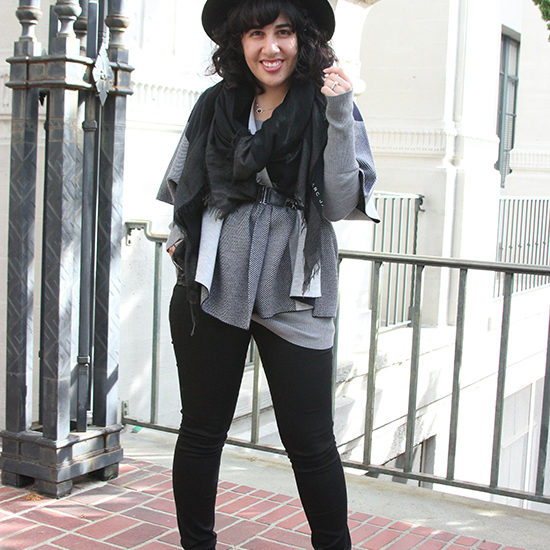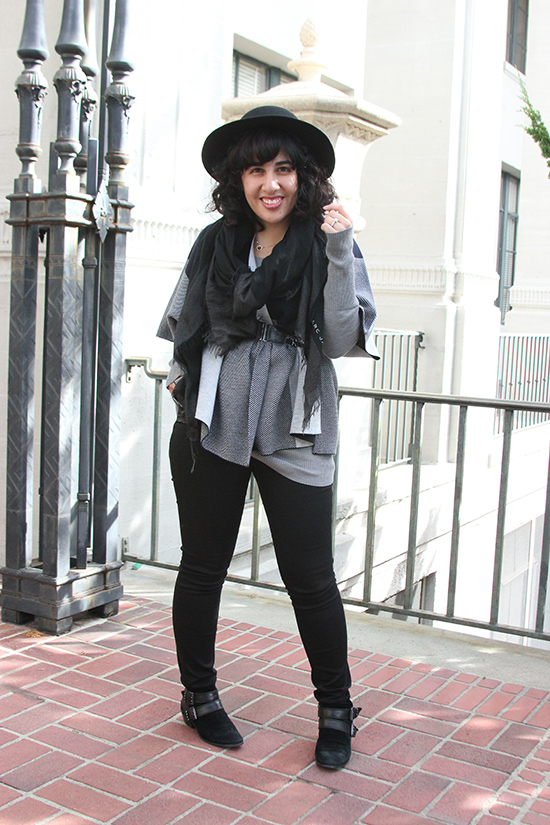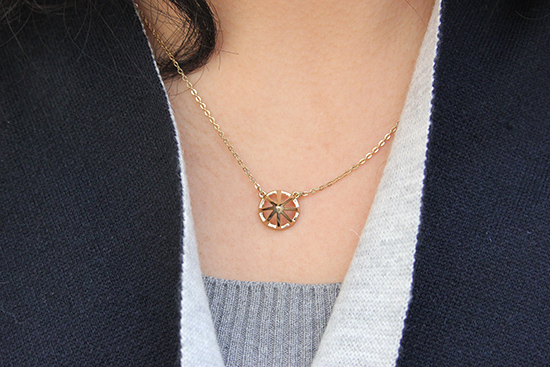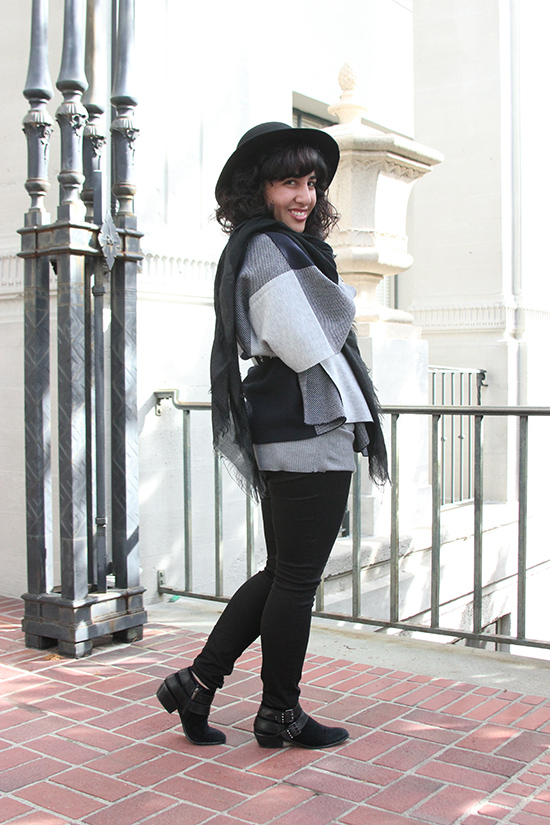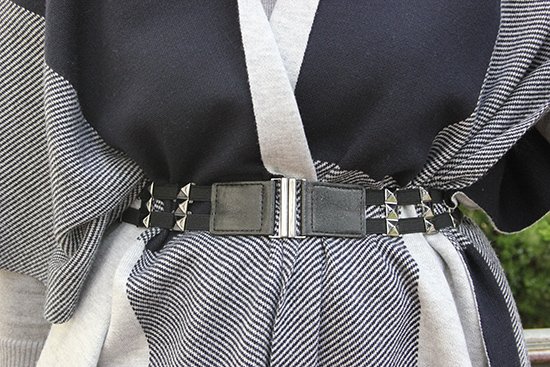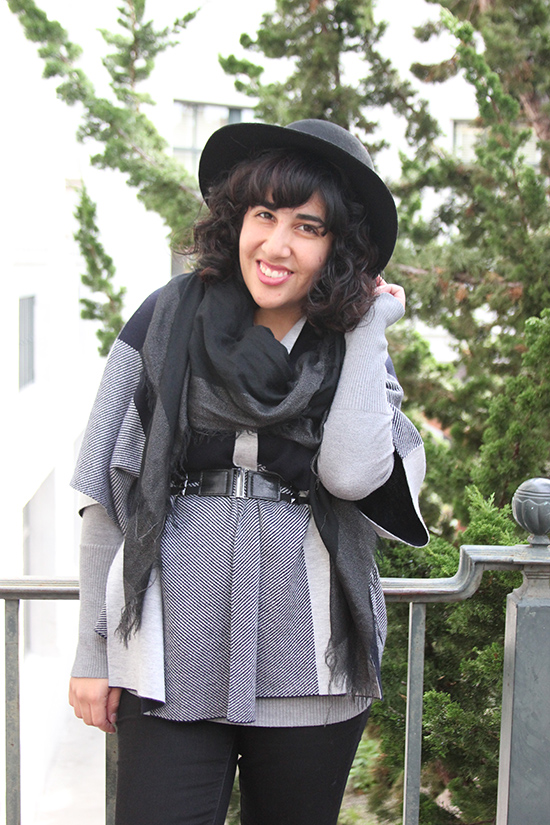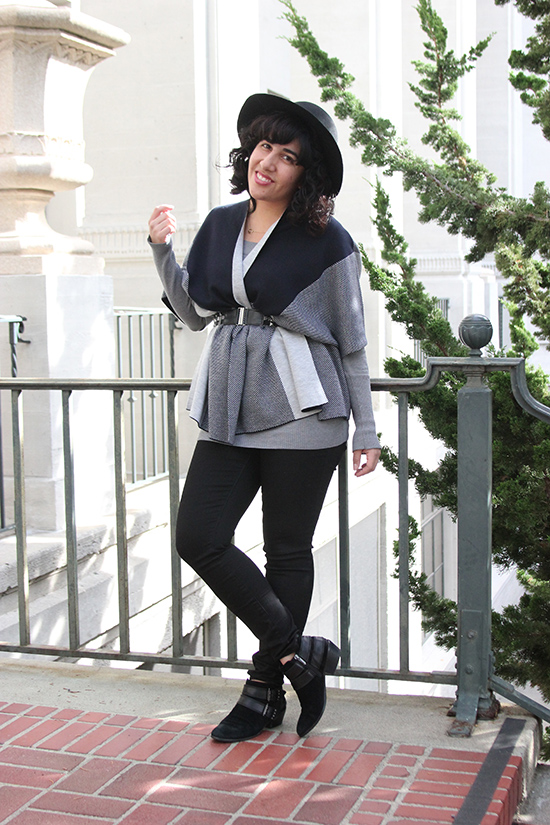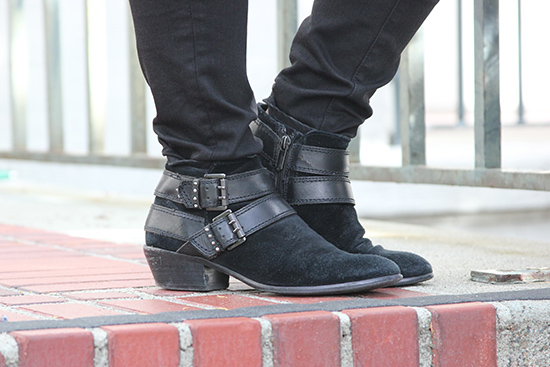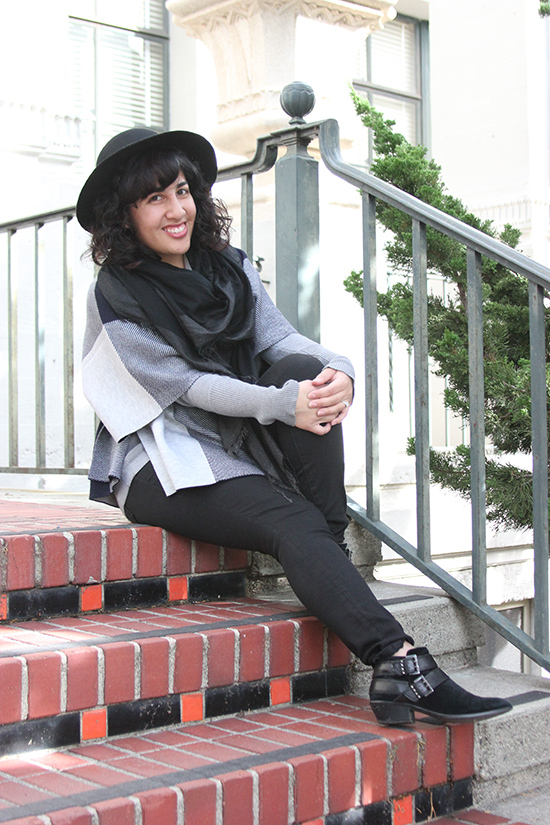 |
| Black Round Wool Hat Forever 21 | Grey and Black Patchwork Poncho Fate via Le Tote | Grey Long Sleeve Sweater Almost Famous | Studded Black Belt Betsey Johnson | Open Cone Pendant Rebecca Minkoff via Le Tote | Black Skinny Jeans in Black Frost Madewell (here) | Black Heeled Booties Sam Edelman | |
I have felt great keeping myself busy and preventing myself from being in the red again. As I mentioned in my last post, I’ve been working to get myself to a point where I can pay off my credit cards in full each month and not have a balance left over in order to avoid paying interest.
Changing my habits did not take effect overnight, but here are some things I started or attempted to help make changes in my spending habits and in order to take control of my personal finances:
1. Set a Realistic Financial Goal – In the back of my mind whenever I would spend money on clothes, I would imagine in the life I was envisioning for myself that I would make a lot more money or win the lottery and didn’t have to worry too much about my credit card debt. Long term goals like paying off credit debt and setting up an emergency fund are great, but I had small goals like spend this much less on coffee shops, or reduce clothing spending by 20%. I was never good at completely cutting things out because I didn’t want to feel like I was depriving myself, but I also needed to recognize having small goals would make a big impact for the long term goals I had.
2. Become a Conscientious Shopper – I watched The Minimalists on Netflix last year and it was really eye-opening to think of the reasons why we consume something or want to consume things. I don’t think I intend to Marie Kondo my closet since I tend to be pretty good at editing and seeing what I have, but it did help me recognize some of my buying habits did not align with my values of being sustainable. I try to buy second-hand first for clothes, but I wanted to also try to ask myself if something is going to enrich my life and also what will leave the house if this comes in? I don’t always ask myself this, but it is a habit I am working on and I’ve seen a reduction in mindless shopping when I am bored.
3. Remove Money-Saving Temptation and Set Yourself Up for Success – In order to help yourself succeed in not spending money, you need to identify your triggers and adjust accordingly. For me, I would click through sales emails and add and buy clothes that way. Unsubscribing from retailer emails has definitely helped me reduce my impulse purchases. I’ve also removed apps from my phone that I would spend too much time browsing items to buy. When I see something I want, I really try to hold off to really think about my purchase. If I am still thinking about it after a designated period, I’ll make the purchase instead of giving in to instant gratification. I also have almost completely removed my credit card info from websites to make sure I always enter in my info and really think about the purchase when I am pulling out my credit card from my wallet. I’ve also been a lot better prepared when I go into work by bringing in my own coffee and lunch in order to reduce unnecessary spending and having a few snacks in my backpack.
4. Surround Yourself with Like-Minded People – I enjoy reading the Money Diaries by Refinery 29 and seeing how real women spend their money. I’ve also been a follower of The Financial Diet (TFD) on Youtube and love getting tips on how to be better with your personal finances by saving money or things to potentially cut out. Besides reading and listening to people that reinforced my goals, I also have friends that have mentioned being aggressive paying off student loans for a year and how the rewarded themselves. To me, it was helpful being around people who weren’t ashamed of talking about cutting things out in order to pay down student loans faster or suggesting getting together for game nights instead of going out once they bought a house. It helps reaffirm your own goals and helps keep you on track when you have others also prepping lunches to avoid eating out or suggesting budget-friendly activities.
5. Check Mint or Bank Apps First Thing in the Morning – It might seem a little odd to check the status of your money first thing before opening any social media account, but it is a good constant reminder of where you are at with your spending and savings. It’s also helpful to notice if you have pending charges you didn’t authorize and to be able to catch it right away in order to get it resolved. I had a love-hate relationship with Mint because it was visually showing me how often I would go over-budget or have high spending on clothes or food. The truth isn’t always what you want to see, but in this case, you have the power to change what you see with your spending and checking the status of your money is a good reaffirmation of your money saving and spending goals.
6. Develop a Side-Hustle – It is better to pay off higher interest credit cards sooner, but most people could always use some extra cash. I edit my wardrobe each season, and when I do, I list items for sale on my Poshmark closet (sign up with my referral code WILLBAKEFORSHOE for $5 Posh Credit) and sometimes I send higher-end designer items to The Real Real. Recently, I’ve also listed items that no longer worked in our new home on Facebook Marketplace and Craigslist to sell, but I have definitely noticed a lot more serious people on Marketplace. My sister has done some pet sitting and dog walking through Rover to have fun making extra money with cute dogs. There are plenty of options out there, all it takes is a little creativity and good work ethic.
7. Give Back! – To quote Anne Frank “No one has ever become poor by giving.” Armando and I have done a lot more volunteering through our local Rotary club, and it feels really good to give back to our community to try and make a positive impact. When we helped with the local food bank in January, we came home feeling grateful for the food in our pantry and reminded us of the value of reducing food waste. For me, it has been helpful to focus my attention on helping others versus just helping myself. It costs nothing to be kind, and although there are membership dues to be part of Rotary, its money well spent hanging out with like-minded people and by trying to make the world a better place.
I hope you find these tips I’ve been following helpful to change some of your own spending habits to meet one of your personal finance goals. I’d love to hear what you do to save money/cut spending in case you have any tips!
Until next time,

